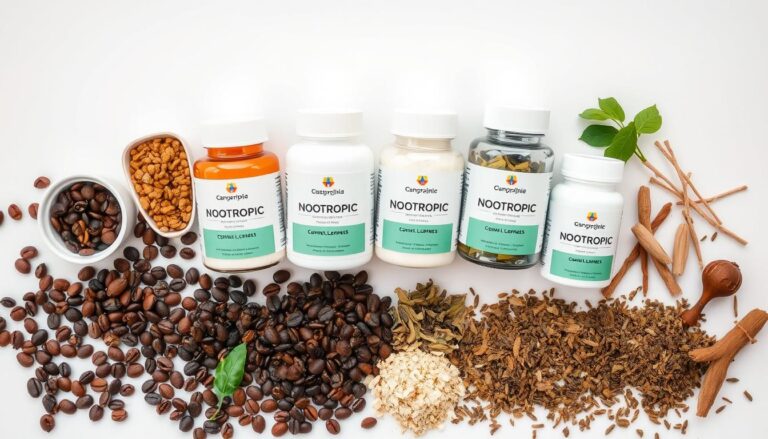- Understanding Nootropics for Sleep
- What Are Nootropics?
- Why Sleep Matters
- The Science Behind Nootropics and Sleep
- Best Nootropics for Sleep
- 1. L-Theanine
- 2. Melatonin
- 3. Bacopa Monnieri
- 4. Valerian Root
- 5. GABA (Gamma-Aminobutyric Acid)
- Using Nootropics for Optimal Sleep
- Possible Side Effects
- Natural Alternatives to Nootropics for Sleep
- 1. Herbal Teas
- 2. Aromatherapy
- 3. Meditation and Mindfulness
- Building Good Sleep Hygiene
- 1. Consistent Sleep Schedule
- 2. Comfortable Sleep Environment
- 3. Limit Screen Time
- Conclusion: Embrace Nootropics for Better Sleep
- FAQs
- References
Understanding Nootropics for Sleep
Nootropics are gaining popularity as brain boosters, often linked to enhanced focus and memory. However, their role in promoting better sleep is just as crucial. Many people struggle to find deep, restful sleep, leading to fatigue and decreased productivity. Thankfully, nootropics can help improve sleep quality. This guide explores the must-have nootropic solutions for achieving better rest.
What Are Nootropics?
Nootropics, or smart drugs, are substances that enhance cognitive function. They improve memory, creativity, and motivation. While most people associate nootropics with tasks demanding high mental acuity, their impact on sleep is equally significant.
Nootropics can positively influence the sleep-wake cycle. Many users report experiencing less insomnia and waking up refreshed. For those seeking better sleep, the right nootropic can make a world of difference.
Why Sleep Matters
Quality sleep plays a vital role in overall health. It allows the body to repair and regenerate, supports learning and memory, and boosts mood. Lack of sleep can lead to serious health issues, including obesity, diabetes, and heart disease.
During sleep, the brain processes information from the day and consolidates memories. Insufficient rest disrupts this process, leading to issues like forgetfulness and lack of concentration. Therefore, enhancing sleep quality should be a priority for everyone.
The Science Behind Nootropics and Sleep
Research shows that certain nootropics encourage relaxation and support healthy sleep patterns. They can regulate neurotransmitters like GABA and serotonin, which are directly linked to mood and sleep quality.
Some nootropics even promote the production of melatonin, the hormone that signals our bodies to sleep. By understanding these mechanisms, users can choose the right nootropics to improve their rest.
Best Nootropics for Sleep
1. L-Theanine
L-Theanine is an amino acid found primarily in green tea. It promotes relaxation without sedation. This nootropic enhances alpha brain waves, leading to a calm yet alert state.
Studies suggest that L-Theanine can help individuals fall asleep faster and improve overall sleep quality. Adding it to your nighttime routine may serve as an effective sleep aid without grogginess.
2. Melatonin
Melatonin is a hormone that regulates the sleep-wake cycle. As a supplement, it has become one of the most popular sleep aids. Melatonin supplementation can help those with irregular sleep schedules, such as shift workers or travelers.
Taking melatonin can decrease the time it takes to fall asleep and enhance sleep duration. Many find that it reduces symptoms of jet lag. However, it’s essential to consult a healthcare professional for proper dosing.
3. Bacopa Monnieri
Bacopa Monnieri is another nootropic known for its calming properties. It has been used in traditional medicine for centuries. Current studies show it can reduce anxiety and promote deeper sleep.
Bacopa aids in balancing cortisol levels, the stress hormone, which contributes to restful sleep. It’s an ideal choice for those who find that anxiety disrupts their slumber.
4. Valerian Root
Valerian Root is a herbal supplement well-known for its sedative effects. It helps to improve sleep quality by calming the nervous system. Many users report falling asleep more quickly and enjoying deeper sleep cycles.
This herb has been used for centuries and continues to be a popular choice for those dealing with insomnia. As with other supplements, consulting a professional is recommended for dosage guidance.
5. GABA (Gamma-Aminobutyric Acid)
GABA is a neurotransmitter that plays a significant role in reducing neuronal excitability. It effectively calms anxiety and promotes relaxation. Supplementing with GABA can help enhance sleep quality.
Studies indicate that GABA supplements can significantly improve sleep efficiency and decrease time spent awake. Those dealing with elevated stress levels might find GABA especially beneficial.
Using Nootropics for Optimal Sleep
Combining nootropics can further enhance their benefits. However, it’s vital to use these substances responsibly. Start with one nootropic to monitor its effects. Once you understand how it impacts your sleep, consider adding other supplements gradually.
A consistent nighttime routine can amplify the effects. Aim for a relaxing environment free from screens, and consider supplementing with calming nootropics about 30 minutes before bedtime.
Possible Side Effects
While nootropics can improve sleep, they can also have side effects. For instance, some individuals may experience headaches or digestive issues. Others may feel groggy upon waking.
Always consult a healthcare professional before starting any new supplement. They can help determine the right dosage and ensure that it won’t interact with existing medications.
Natural Alternatives to Nootropics for Sleep
In addition to nootropics, many natural aids can promote better sleep. Here are some effective alternatives:
1. Herbal Teas
Herbal teas like chamomile and lavender can be calming. They often help ease anxiety and prepare the body for sleep. Enjoying a warm cup an hour before bedtime can create a peaceful bedtime ritual.
2. Aromatherapy
Essential oils like lavender and sandalwood have soothing effects. Using a diffuser or applying diluted oils can help create a tranquil sleeping environment.
3. Meditation and Mindfulness
Practicing mindfulness or meditation before bed enhances relaxation. These techniques lower stress and create a calming state, making it easier to drift off to sleep.
Building Good Sleep Hygiene
Good sleep hygiene goes a long way in enhancing your sleep quality. Here are some essential practices:
1. Consistent Sleep Schedule
Going to bed and waking up at the same time daily helps regulate your internal clock. Aim for a minimum of 7-9 hours of sleep each night.
2. Comfortable Sleep Environment
Create a sleep-friendly environment. Keep the room dark, cool, and quiet. Consider using blackout curtains and a white-noise machine if needed.
3. Limit Screen Time
Avoid screens an hour before bed. The blue light from phones, tablets, and computers can disrupt melatonin production, making it harder to sleep.
Conclusion: Embrace Nootropics for Better Sleep
Nootropics for sleep offer promising solutions for those struggling with rest. From L-Theanine to Melatonin, these substances can enhance sleep quality, helping users wake up refreshed. However, it’s crucial to approach their use responsibly and to consult professionals when in doubt.
By adopting good sleep hygiene practices and considering nootropics, anyone can unlock the door to better sleep. Investing in quality sleep is one of the best moves you can make for your overall well-being.
FAQs
1. What are nootropics for sleep?
Nootropics for sleep are substances that enhance sleep quality, promoting relaxation and reducing anxiety.
2. Do nootropics have side effects?
Some users may experience headaches or grogginess. It’s essential to consult a healthcare professional for guidance.
3. Can I mix different nootropics?
Yes, but start with one to monitor effects before combining them.
4. How long before bed should I take nootropics?
Generally, taking them 30 minutes to an hour before bed is recommended.
5. Is melatonin safe?
Melatonin is generally safe but should be taken in recommended doses. Consult a doctor if unsure.
6. Can I use nootropics with other medications?
Always consult with a doctor to avoid potential interactions.
7. How do I know if nootropics are working for me?
Track your sleep quality over time. Notice how you feel upon waking and during the day.
8. Are there natural alternatives to nootropics for sleep?
Yes, herbal teas, aromatherapy, and mindfulness practices can also aid sleep.
9. How important is sleep hygiene?
Very important. Good sleep hygiene practices enhance overall sleep quality significantly.
10. Can I become dependent on nootropics?
While most nootropics aren’t addictive, it’s essential to use them responsibly and not to rely on them completely.
References
– Healthline: The Sleep-Wake Cycle
– Cleveland Clinic: Melatonin
– PubMed: Nootropics and Cognitive Enhancement
– National Center for Biotechnology Information: Bacopa Monnieri
– American Sleep Association: Sleep Hygiene
Invest in the quality of your sleep. The benefits are simply extraordinary!



